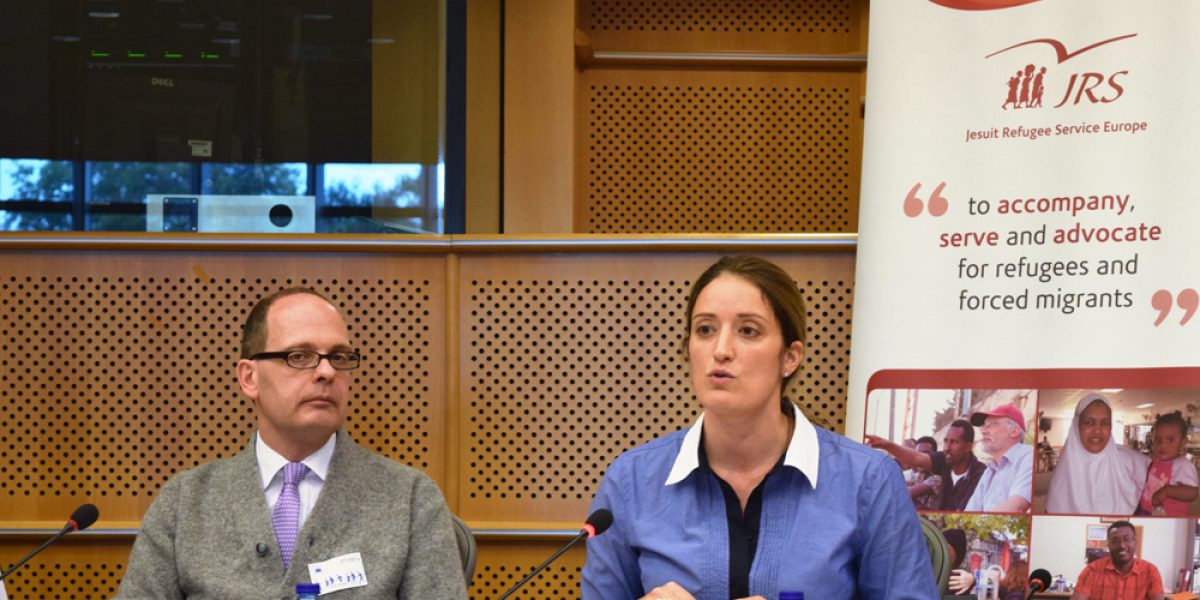
Brussels, 8 October 2014 – JRS Europe launched its new report ‘Rescued – What Next? Protection seekers stranded in Sicily‘ at a policy briefing in the European Parliament in Brussels yesterday. The briefing and discussion drew a clear link between Italian and EU policies on reception conditions for asylum seekers. It called on European decision-makers to work together to find joint solutions to better accommodate and integrate forced migrants.
“Although we knew that because of the developments in Afghanistan, Syria or Iraq refugee numbers would rise, Europe was not prepared and still isn’t prepared. There has so far been no co-ordinated European effort to meet the current refugee crisis,” said JRS senior policy officer Stefan Kessler.
According to Mr. Kessler the Italian government could do a lot more to drive the debate and call for more European cooperation on asylum and reception systems. Especially now, during the Italian presidency of the EU, the time is ripe for a more balanced and careful allocation of resources to improve reception conditions in Italy and other EU member states.
Mr. Kessler called on MEPs such as Barbara Lochbihler (hosting the event) and Roberta Metsola (also on the panel) to use their mandate, to ask the difficult questions, to initiate more in-depth reports together with NGOs and to exert their influence to allocate more of the EU budget for better reception and asylum systems rather than simply boosting border security.
“Hundreds of migrants are literally packed in the CARA reception centre and after three years they are in the same situation. They can’t speak Italian. There are not enough classes. We could spend the money allocated for accommodation better,” argued Italian refugee lawyer Riccardo Campochiaro.
The lack of prospects for migrants stuck in Italy due to the Dublin regulation was painfully made clear by Nikiema Mahamadi, who has subsidiary protection status in Italy. “With this document I cannot walk in all of Europe, I have to stay in Italy,” he said, “and Italy alone cannot take care of all these people.” Whilst EU member states are happy to recognise each other’s denied asylum seekers, there is still no mutual recognition of successful asylum claims.
Roberta Metsola MEP from Malta, admitted the ‘need to do more, much more’ to effectively protect refugees. As a cause for optimism she cited recent discussions about modifying the Dublin regulation for meeting the needs of unaccompanied minors. Legislation is also underway to reform the EU Visa Code which would provide for an opportunity to introduce new safe and legal ways to protection.
However, JRS still witnesses a lack of political will to really improve asylum and reception systems in a coordinated way.
JRS researcher and author of the report Danielle Vella gave a powerful account of what she learnt during the project: “For me this is a story of hope. I witnessed the slow-dying of hope in the migrants that I interviewed. People in the CARA hope that they will get a document and then their lives will be better. But people with a protection status living outside the CARA are often worse off. They’ve completed courses to be a pastry chef, but still cannot find work.
All the migrants we spoke to offered their sincere thanks to the Italy for saving them from the sea. But then they would respectfully add that they needed more help to get themselves back on their feet. They want a normal life with a job that pays the rent. Real protection means to be able to live your life to the full, to give and to take and to enjoy being a part of a community.”
JRS Europe director Michael Schöpf summarised the disconnect between Europe’s values and deeds: “Even recognised refugees in Italy sleep on the streets and remain the objects of somebody else’s will. Destitution is not only a violation of human dignity, but something that degrades us all as a society. Where are our values of compassion, solidarity and hospitality?”
Although we knew that because of the developments in Afghanistan, Syria or Iraq refugee numbers would rise, Europe was not prepared and still isn’t prepared. There has so far been no co-ordinated European effort to meet the current refugee crisis.

